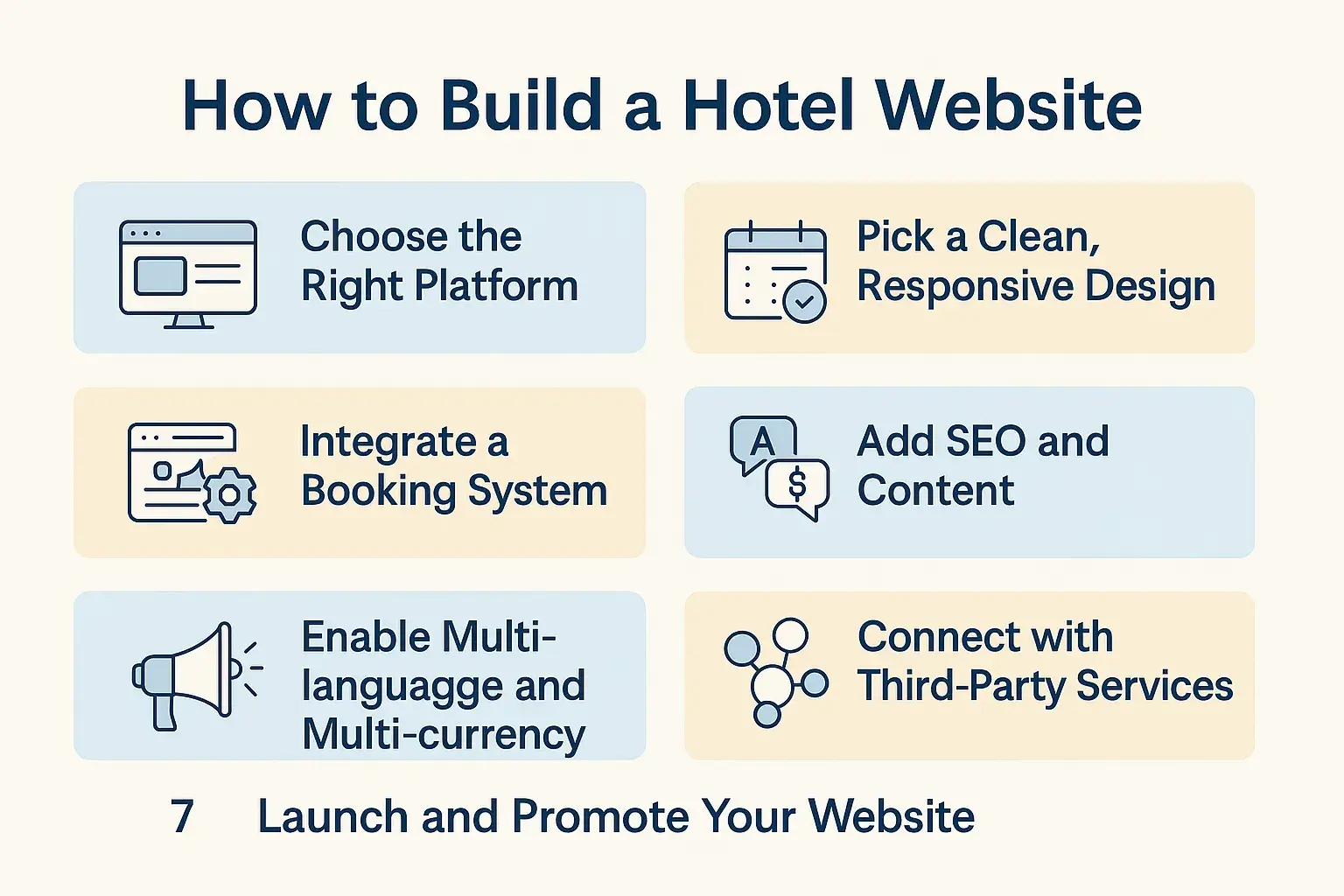A professional hotel website is more than a digital brochure — it’s your most powerful sales tool. In this comprehensive guide, you’ll learn how to build a hotel website that drives direct bookings, showcases your property, and ranks high on search engines.
1. Why Every Hotel Needs a Website in 2025
With OTAs (Online Travel Agencies) charging high commissions, owning a hotel website allows you to:
- Accept direct bookings
- Build your brand and trust
- Share local content for SEO
- Provide seamless mobile experiences
Even if you list on Booking.com or Agoda, your own website gives you control over guest communication and loyalty.
📌 Related post: How To Start A Restaurant — a helpful guide if you’re also in the F&B business.
2. Plan Your Hotel Website Structure
Before jumping into design, outline a clear structure. Recommended pages:
- Home
- Rooms & Rates
- Online Booking / Reservations
- About Us
- Location / Contact
- Testimonials & Reviews
- Blog (for SEO content like “Top Things to Do in [Your City]”)
Use tools like Lucidchart or pen and paper to draft your sitemap.
3. Choose the Right Platform (WordPress, Webflow, etc.)
We recommend using WordPress because:
- Thousands of hotel themes
- Easy plugin integration (booking, payment, SEO)
- SEO-friendly architecture
Other good platforms: Webflow, Wix, Squarespace, if you prefer drag-and-drop simplicity.
🔗 Learn more: WordPress for Hotels – WP Beginner Guide
4. Pick a Clean and Responsive Design
Mobile-first design is critical, as over 60% of users book travel on smartphones. Look for themes with:
- Room galleries
- Booking form integration
- Review sections
- Speed optimization
👉 Recommended Theme: OceanWP, Astra, or Hotel Booking by MotoPress.
5. Integrate an Online Booking System
Enable guests to book directly from your website with:
- Real-time availability calendars
- Payment gateways (Stripe, PayPal)
- Email confirmations
Popular plugins:
- MotoPress Hotel Booking
- WP Hotelier
- HBook
✅ Pro Tip: Sync your availability with platforms like Airbnb or Booking.com using iCal or API.
6. Add High-Quality Visual Content
Use professional photography to showcase:
- Rooms, lobby, pool, dining area
- 360° virtual tours or video walkthroughs
Compress images with TinyPNG to maintain speed
💡 Bonus: Use alt text like “deluxe king room in Hanoi hotel” for SEO.
7. Optimize Your Site for SEO
Here’s how to optimize for “how to build a hotel website”, “hotel web design”, and “hotel SEO”:
- Include target keywords in H1, meta title, and description
- Internal linking (to blog posts like How To Start A Restaurant)
- External links to high-authority sources
- Fast loading speed (use LiteSpeed Cache plugin)
- Submit sitemap to Google Search Console
🔎 Related: Moz Beginner’s Guide to SEO
8. Enable Reviews and Testimonials
Display customer testimonials to build trust. Options include:
- Embedded Google Reviews
- Manual testimonials with photos
- Star ratings for rooms
Plugins like Strong Testimonials or Site Reviews can help.
9. Connect With Third-Party Tools
Boost your site’s performance with integrations:
- Google Analytics 4 for visitor tracking
- Facebook Pixel for retargeting
- Tawk.to or WhatsApp Chat for instant support
10. Secure and Maintain Your Website
- Use HTTPS/SSL
- Schedule automatic backups (with UpdraftPlus)
- Keep plugins & WordPress updated
- GDPR-compliant cookie consent banner
Pro Tip: Use Cloudflare for added speed and protection.
11. Final Thoughts: Your Hotel Website Is Your 24/7 Sales Rep
If you host international guests, consider a multilingual setup with WPML or TranslatePress. Offer language options like:
- English
- Vietnamese
- French
- Chinese
This improves global accessibility and trust.
12. Write SEO-Optimized Blog Content
A blog improves rankings and adds value. Ideas:
- “Top 10 Attractions Near Our Hotel in Da Nang”
- “Why Book Directly With Us?”
- “A Day in the Life at [Hotel Name]”
In each post:
- Use internal links to room and booking pages
- Add external links to travel authorities
- Optimize images and include keywords
✅ Bonus: Post regularly (at least 1–2 times per month).
13. Track Performance & Conversion
Data is key to improving UX and ROI. Use:
- Google Search Console (indexing, keyword CTR)
- Google Analytics (bounce rate, page time)
- Hotjar (heatmaps, session replays)
- Meta Business Suite (ad performance, remarketing)
Tweak underperforming pages based on these insights.
14. Promote Your Hotel Website
A great website needs traffic. Promote it with:
- Google Ads (target “hotels in [city]” keywords)
- Meta Ads (carousel & video retargeting)
- SEO backlinks (from travel blogs, directories)
- Google Business Profile: update hours, map pin, images
📲 Add QR codes to your brochures that link to your booking page.
15. Integrate Email Marketing
Build your mailing list for:
- Booking confirmations
- Promotions & discounts
- Seasonal updates
Use Mailchimp, MailerLite, or FluentCRM. Add forms on your homepage and checkout.
16. Final Thoughts: Your Hotel Website Is Your 24/7 Sales Rep
A high-performing hotel website will:
- Increase direct bookings
- Improve guest experience
- Strengthen your brand
- Lower OTA dependency
Need help building your hotel site? Contact A369 Software — we specialize in WordPress development, SEO, and performance for the hospitality industry.
🧭 Explore More:

